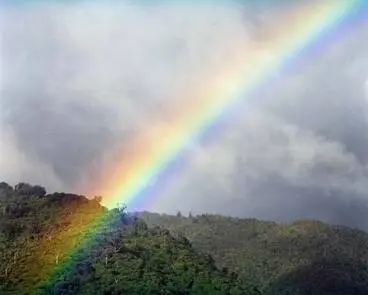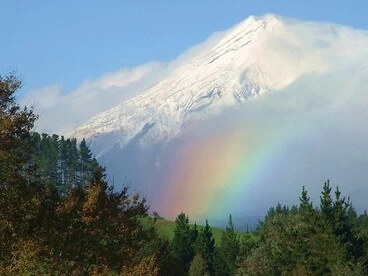How are rainbows formed?
Sunlight, or "white" light, is made up of bands of different coloured light -- red, orange, yellow, green, blue, indigo and violet. When sunlight passes through raindrops, the light bends, or refracts, as it enters the droplet, and then reflects off the inside of the raindrop. As it exits the droplet, the light separates into wavelengths or frequencies. Each wavelength appears as a different colour, which refracts slightly differently from another colour when it passes from one medium to another. A prism can also create a rainbow because the glass, like the raindrop, bends the different colours of light at slightly different angles.
The name "Roy G. Biv" is one way to recall the colours of the rainbow:
Red, Orange, Yellow, Green, Blue, Indigo, Violet
Manatū Taonga, the Ministry for Culture and Heritage
Folklore
The rainbow has a symbolic meaning for various cultures and religions. According to the Bible, after Noah saved the animals from the Great Flood, a rainbow appeared that came to symbolize God's promise that he would never send another flood to destroy all of the earth (Genesis 9:13–17)
Pot of gold:
In Irish folklore a pot of gold can be found at the end of a rainbow guarded by a Leprechaun.
End of the rainbow
Manatū Taonga, the Ministry for Culture and Heritage
The climate and the land
Manatū Taonga, the Ministry for Culture and Heritage
Rainbow May 09 e
Manatū Taonga, the Ministry for Culture and Heritage
Bridge:
In Norse religion a burning rainbow bridge called the Bifrost connects Midgard (earth) with Asgard, home of the gods, and can be used only by gods and those who are killed in battle. Māori tell a tale of Hina, the moon, who caused a rainbow as a bridge for her mortal husband to return from heaven to earth to end his days as death could not enter her celestial home. In Japanese mythology rainbows are seen as the "Floating bridge of Heaven" that Izanagi and Izanami descended to create the first lands.
Four Seasons
Manatū Taonga, the Ministry for Culture and Heritage
Rainbow, St Bathans Domain, Central Otago
Manatū Taonga, the Ministry for Culture and Heritage
Rainbow3
Central Otago Memory Bank
Messenger:
In Greek and Roman mythology, Iris the goddess of the rainbow was the messenger of the goddess Hera and carried a caduceus or winged staff entwined by serpents. Anuenue, the rainbow maiden, appears in Hawaiian legends as the messenger for her brothers, the gods Tane and Kanaloa. In China the rainbow is a bridge illustrated by a double-headed dragon which is the mediator between heaven and earth, relaying people's thoughts and prayers from the earth-bound head and sending them to the head pointed heavenwards.
rainbow over Levin
Kete Horowhenua
Archer's bow:
The rainbow is depicted as an archer's bow in Hindi mythology. Indra, the god of thunder and war, uses the rainbow to shoot arrows of lightning. In Arabian mythology, the rainbow is the bow of a weather god, Quzaḥ.
Rainbow over the Māngere Bridge, Onehunga, 2009
Auckland Libraries
Rainbow
Central Otago Memory Bank
Blessed Rainbow
Manatū Taonga, the Ministry for Culture and Heritage
Serpent:
The Navajo see the rainbow as a multi-colored serpent which, when seen by a young brave, is to be ridden to the spirit world so as to receives guidance as a form of initiation. In Aboriginal mythology, the Rainbow Serpent is the creator of the world and all beings.
Rainbow at the Pier
Christchurch City Libraries
Rainbow Church
Manatū Taonga, the Ministry for Culture and Heritage
Meditation:
In Hindu and Buddhist Tantra those who have surpassed their earthly ties are in a position to achieve the highest meditative state, and experience the “rainbow body” before Nirvana is reached. The rainbow is also a symbol of yin and yang in Chinese legend with the five colours harmonised, representing perfect balance.
Li'l Lodge
Manatū Taonga, the Ministry for Culture and Heritage
Further information:
Best, Elsdon. "Rainbow Myths", Maori Religion and Mythology, Part 2, p. 414, (Wellington, New Zealand, 1982)













